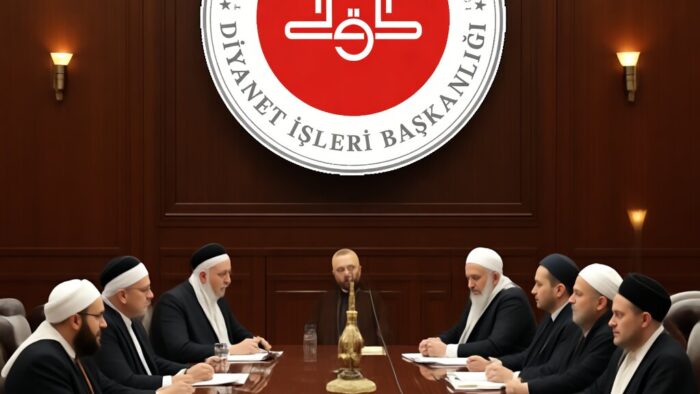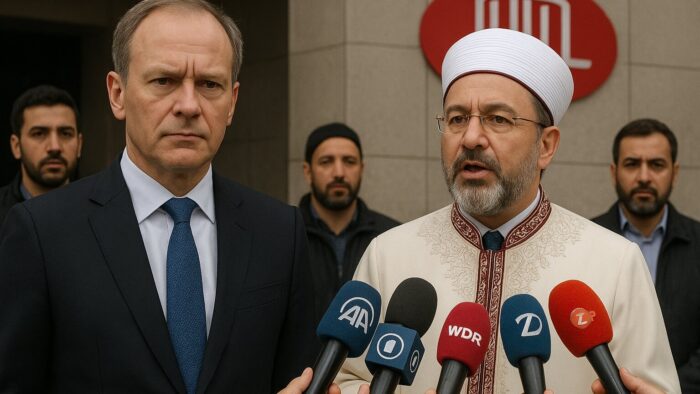The German government urged the Turkish-Islamic Union for Religious Affairs, the country’s main mosque association with around 1,000 mosques, to cut ties with Turkish President Recep Tayyip Erdogan due to his antisemitic and Islamist statements and concerns about Turkish government influence operations. On 11 September 2025, The Jerusalem Post reported that Germany’s Federal Ministry of Interior expects DITIB to clearly distance themselves from organizations and individuals who spread antisemitic messages or promote Islamist agendas. The article begins:
The German government has urged the country’s main mosque association — the Turkish-Islamic Union for Religious Affairs (DITIB) — to cut ties with Turkish President Recep Tayyip Erdogan due to his antisemitic and Islamist statements. “We expect [DITIB] to clearly distance themselves from organizations and individuals who spread antisemitic messages or promote Islamist agendas,” a Federal Ministry of Interior spokesperson told German media. Concerns about DITIB arose following the Muslim Scholars Meeting in Istanbul on August 22, which brought over 150 Islamic scholars from 50 countries to the capital to discuss Gaza. The meeting was convened by the International Union of Muslim Scholars and the Turkish Presidency of Religious Affairs (also known as Diyanet), the latter of whose president, Ali Erbas, called on Palestinians to use “all legitimate means of resistance against the Zionist occupation, including armed resistance.”
Read more: https://www.jpost.com/international/article-867197
Key Points
- DITIB is subordinate to Turkey’s Diyanet religious authority and financially dependent on it, with the association sometimes called the long arm of Erdogan operating around 1,000 mosques in Germany.
- Terrorism expert Nicolas Stockhammer warned that Diyanet could instrumentalize DITIB mosques to preach radical content and push younger people into the radical sphere, with connections to the Muslim Brotherhood becoming closer.
- Germany’s Ministry of Interior stated in 2020 that DITIB not only contributes to the active formation of opinion in the interests of the Turkish government but also offers the Turkish Intelligence Service many potential informers and whistleblowers.
- According to a ZDF report, at least nineteen DITIB imams conducted espionage against targets in Germany on behalf of Turkey, highlighting concerns about Turkish government intelligence operations through religious institutions.
DITIB in Germany: How Turkey’s Diyanet Controls 900 Mosques and Shapes Muslim Communities
The Turkish-Islamic Union for Religious Affairs (DITIB) operates as a mosque umbrella organization managing over 900 mosques in Germany, functioning as the German branch of Turkey’s Directorate of Religious Affairs (Diyanet). The organization maintains structural dependence on the Turkish state, with imams sent from Ankara and salaries paid by either the Diyanet or local Turkish consulates.
DITIB representatives hold seats on advisory boards of Islamic theology programs at German universities, while the organization cooperates with state schools in providing Islamic education. Germany has sought to reduce this foreign influence by cutting funding to DITIB and attempting to train imams domestically rather than relying on clerics dispatched from Turkey.
Concerns about DITIB’s activities have manifested in multiple documented incidents. Board members at DITIB mosques in Osnabrück, Hildesheim, and Hanover made anti-Semitic and anti-constitutional Facebook posts, according to research conducted by the Göttingen Institute for Democracy Research. Beyond social media controversies, German mosques belonging to DITIB transferred donations from believers to a Turkish Consulate General account in Hamburg, allegedly to cover a religious attaché’s educational expenses. Internal documents revealed that minimum donation amounts were specified, with threats reportedly made to withdraw imams from communities that failed to meet fundraising targets.
The organization’s proximity to Islamist ideology has emerged through various channels. A DITIB imam in Stuttgart praised Hamas founder Ahmad Yasin on Facebook, describing him as having messages for those who care about Jerusalem. This incident exemplified ongoing criticism of DITIB’s proximity to Turkish President Recep Tayyip Erdogan. Similarly, cooperation between DITIB and German state schools remained contentious, with North Rhine-Westphalia announcing renewed Islamic instruction cooperation with DITIB despite a 2017 termination following an espionage affair. Critics noted that amended statutes guaranteeing independence from the Turkish state showed only marginal content changes.
Recent developments have intensified scrutiny of Turkish influence operations in Germany. German intelligence identified Turkish intelligence conducting covert operations within German borders, targeting opposition groups and diaspora organizations critical of Ankara through surveillance networks. The Union of International Democrats (UID) emerged as a key instrument of Turkish state influence, having engaged in over 1,000 joint activities with mosques and NGOs, revealing a strategy of embedding political objectives within religious networks such as DITIB.
Germany’s interior ministry has formally demanded that DITIB distance itself from extremist rhetoric, particularly following an August 2025 Istanbul conference where Turkey’s top cleric endorsed statements supporting Hamas and calling for global jihad.
According to Nordic Monitor, German officials have allocated 465,000 euros to support domestic imam training programs, aiming to replace the system where Diyanet appoints and pays clerics stationed in Germany. Despite these efforts, the Diyanet continues expanding international programs, with 75 graduates of Turkish theology faculties traveling to Germany annually for a two-year program, obligating them to serve as imams for at least 10 years.
External References:
— Germany pressures Turkish government-funded mosques to break with radical messaging — Nordic Monitor
— Diyanet Serves as Tool for Turkish Soft Power in Germany — Middle East Forum
— Turkish-Islamic Union for Religious Affairs — Wikipedia
Disclaimer:
The Global Influence Operations Report (GIOR) utilizes AI throughout the posting process, including the generation of summaries for news items, introductions, key points, and, often, the “context” section. We recommend verifying all information before use. Additionally, all images are generated using AI and are intended solely for illustrative purposes. While they represent the events or individuals discussed, they should not be interpreted as real-world photography.










